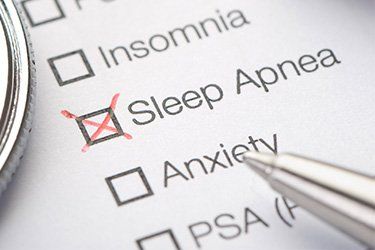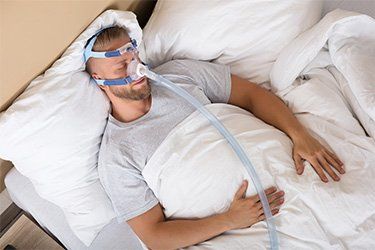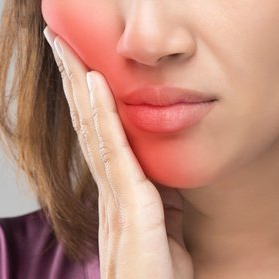Obstructive Sleep Apnea and Hypertension
Hypertension (or high blood pressure) is an extremely common condition. In fact, it affects about 47% of adults in the United States alone. Similarly, obstructive sleep apnea (OSA) is the most common type of sleep disordered breathing affecting an estimated 10% to 30% of adults in the United States. Both of these conditions can cause dangerous health complications like heart attacks, which is why it’s important to understand what causes hypertension and sleep apnea to protect your health. But what many people don’t know is that one of the causes of hypertension (high blood pressure) is actually obstructive sleep apnea. Keep reading to find out what these conditions are, what causes them, and how Dr. Maryam Seifi at Breath of Life Dental can help you if you have hypertension caused by obstructive sleep apnea.
A Basic Overview of Your Cardiovascular System
Your cardiovascular system, also known as your circulatory system, is composed of your heart and blood vessels. Cardio- comes from a Greek word meaning “heart,” and vascular comes from a Latin word meaning “vessel.” And a vessel in this case is a passageway through which blood or other bodily fluids can move. In your body, your blood vessels are your veins and arteries.
Your heart sits in your chest and pumps oxygen-rich blood out into your body via your arteries. As it pumps, it also draws back in through your veins the blood that has been pumped out through your arteries. This is why it’s also known as your circulatory system, because it circulates the blood through your body. This system is important because by passing back through your heart, your blood receives fresh oxygen from your lungs and drops off carbon dioxide for you to exhale from your body.
How Can We Help You?
What Is Blood Pressure?
Blood pressure is a measure of how much force it takes for your heart to pump the blood out through your arteries. A good example of this is blowing up balloons: some balloons are loose and stretchy, which makes them easy to blow up with air with a low amount of pressure. Other balloons are tight and hard, and it takes much more pressure from your lungs to blow them up with air.
Your blood pressure can change depending on various factors like stress, maintaining an active or sedentary lifestyle, whether or not you smoke, or the type of foods you eat on a regular basis. Your ambulatory blood pressure (the natural fluctuation of your daytime blood pressure while you handle regular activities) can be different from your blood pressure in times of stress or when you are asleep.
How Do You Measure Blood Pressure?
You’ve probably received a blood pressure test at some point in your life. At most medical appointments, the doctor or nurse will wrap a cuff around your arm and have you hold still while it inflates. Then it slowly deflates and the doctor or nurse tells you that your blood pressure is “120 over 80” or some other pairing of numbers and moves onto the next step of your checkup.
What’s happening during this test is simple. The cuff squeezes your arm to cut off the circulation (blood flow) through your brachial artery, which is a large artery that runs down your bicep and into your elbow joint. Once the cuff has cut off the circulation, you would not feel a pulse in that artery because no blood is running through it. As the cuff starts to deflate, the blood comes back through your artery until it is flowing normally again.
During this process, there are two points where your blood pressure is measured: once when your heart contracts to pump blood through your brachial artery, and once when your heart relaxes and expands again. Those two measurements give you the two different numbers in your blood pressure reading, which are called your systolic and diastolic blood pressure.
Systolic Blood Pressure
Systolic
comes from a Greek word meaning “to contract.” The first number of your blood pressure reading, your systolic blood pressure, is a measure of the pressure in your arteries when your heart contracts to pump blood through. In the above example of “120 over 80,” the number
120
is the systolic blood pressure. This is essentially how much force it takes your heart to send blood into your arteries when it contracts. In general, a good systolic blood pressure range for adults is between 90 and 120.
Diastolic Blood Pressure
Diastolic
comes from a Greek word meaning “to separate or expand.” The second number of your reading, your diastolic blood pressure, is a measure of the pressure in your arteries between the beats of your heart when it relaxes (or expands). In the above example of “120 over 80,” the number
80
is the diastolic blood pressure. This is essentially how much pressure there is on your arteries when your heart relaxes after a contraction. In general, a good diastolic blood pressure range for adults is between 60 and 80.
What Is Hypertension?
The prefix hyper- comes from a Greek word meaning “over or beyond,” and tension comes from a Latin word meaning “to stretch or strain.” When talking about your cardiovascular system, hypertension means it takes an amount of force over or beyond what is normal to pump your blood through your arteries and it is causing strain on your heart. Essentially, hypertension is just another term for “high blood pressure.”
Why Is High Blood Pressure Bad for Your Health?
High blood pressure (hypertension) means that your heart consistently has to work harder to pump blood through your veins. Again, a good example of this is blowing up balloons: some balloons are loose and stretchy, which makes them easy to blow up with air with a low amount of force. Other balloons are tight and hard, and it takes much more force from your lungs to blow them up with air. If you had to blow up a bunch of balloons, would you rather have stretchy balloons that require little air pressure, or tight balloons that require much more air pressure? Most people would prefer the stretchy balloons because they’re easier to inflate.
It’s the same for your heart. Low blood pressure is like the stretchy balloons, and high blood pressure is like the tight balloons. Your heart has a much easier time with low blood pressure because it doesn’t have to work as hard or strain itself to force the blood through your arteries. When you have high blood pressure, your heart gets overworked which can lead to
dangerous health problems.
If the Heart Is a Muscle, Won’t High Blood Pressure Make It Stronger?
You might think, “The heart is a muscle. Shouldn’t working harder make it stronger?” And the answer is technically yes, but it doesn’t end up the way you’re thinking. If you’ve ever done too much during a workout or suddenly been very active after a long period of inactivity, you’ve probably experienced sore muscles. When you overwork your muscles, they can get stronger, but they can also tear and feel incredibly sore or painful, too. Thankfully, when you overwork your legs or arms, you can lie down and give them a rest until they feel better.
Your heart is a muscle, but unlike the other muscles in your body, it never gets to stop working. This is fine when you have normal blood pressure and healthy lifestyle habits because your heart was made to handle those conditions. But if you overwork your heart with high blood pressure, it can cause your heart muscle to get thicker just like bulking up your arms or legs at the gym. But your heart isn’t meant to do that.
If your heart muscles are too thick, weakened from overworking, or enlarged, it actually increases your risk of heart attack or heart failure. That’s why it’s so important to take care of your heart by maintaining a healthy diet, getting plenty of rest, and staying active.
Is Low Blood Pressure Bad for Your Health?
Because high blood pressure is bad for your health, you might think that the lower your blood pressure, the better your health. And that is true to an extent, but there are some dangers to your health if your blood pressure is too low. Low blood pressure is also called hypotension, with the prefix hypo- coming from a Greek word meaning “under.” People with abnormally low blood pressure (hypotension) can also experience dangerous side effects without treatment to address their condition. In general low blood pressure for adults is a systolic measurement (the top number) of 90 or lower and a diastolic measurement (the bottom number) of 60 or lower.
Low blood pressure (hypotension) can be just as dangerous as high blood pressure, so it’s important to see your doctor if you are experiencing any symptoms. Low blood pressure (hypotension) is caused by several different factors, including dehydration, pregnancy, certain medications, and some medical conditions. Some people who have low blood pressure will not notice any symptoms; but for those who do experience symptoms, common ones include:
- Dizziness
- Fainting
- Fatigue
- Nausea
- Blurred vision
- Trouble focusing
Causes of High Blood Pressure (Hypertension)
The causes of hypertension depend on the type of hypertension you have (either primary or secondary). Some of these causes can be addressed with lifestyle changes like routine exercise, healthy eating, and finding ways to manage your stress. Your doctor will work with you to determine a treatment plan that best addresses the causes of your high blood pressure to get your measurements back into a healthy, safe range. This is why it’s important to be honest with your doctor about your lifestyle habits so they can best help you get your high blood pressure under control.
Symptoms of High Blood Pressure (Hypertension)
Hypertension is commonly called “the silent killer” because most people don’t notice the symptoms. Or, in many cases, people with hypertension will misattribute their symptoms to something else like stress. Common symptoms that people with high blood pressure experience include:
- Shortness of breath
- Fatigue
- Confusion or trouble focusing
- Headaches
- Blurry vision
- Nosebleeds
- Blood in your urine
- Chest pain
- Seizures
If you are experiencing one or more of these symptoms, don’t wait to see your doctor. While high blood pressure cannot always be cured, it can be properly managed with lifestyle changes and healthy eating. The sooner you can start getting your high blood pressure controlled, the better your health outcomes will be.
Risks of Untreated High Blood Pressure (Hypertension)
If you have high blood pressure, it’s important to see a doctor for a treatment plan right away. This is because untreated hypertension can lead to severe health complications, and it can even be fatal if it’s not controlled. In fact, hypertension was either the primary cause or a contributing cause of over 670,000 deaths in the United States in 2020.
Some of the health complications you can experience from uncontrolled hypertension include:
- Heart disease (the leading cause of death in the United States)
- Stroke (the fifth leading cause of death in the United States)
- Heart attack or failure
- Enlarged heart
- Kidney scarring or failure
- Dementia
- Blood vessel or nerve damage in the eyes
- Pregnancy complications
- Artery damage
- Aneurysms
- Erectile dysfunction
Can Obstructive Sleep Apnea Cause High Blood Pressure?
Obstructive sleep apnea (OSA) has been closely associated with hypertension (high blood pressure) and other heart problems. In fact, obstructive sleep apnea syndrome has been verified as a cause of secondary hypertension. This is because obstructive sleep apnea (OSA) is a sleep disorder where the airway is partially or completely blocked during sleep, which causes you to suffocate in your sleep. These episodes of stopped breathing cause a decrease in oxygen levels in the blood and disrupt normal sleep patterns. Over time, this combination of stress and low oxygen levels can contribute to high blood pressure.
How Obstructive Sleep Apnea (OSA) Causes High Blood Pressure
There are several different ways that obstructive sleep apnea contributes to or causes high blood pressure:
Will I Definitely Get High Blood Pressure (Hypertension) if I Have Obstructive Sleep Apnea?
Not all patients with obstructive sleep apnea will develop high blood pressure, but there is a strong association between the two conditions. If you suspect you have sleep apnea or are experiencing symptoms like loud snoring, gasping for breath during sleep, or excessive daytime sleepiness, it's essential to consult a doctor for evaluation and treatment. Treating sleep apnea can help lower blood pressure levels and reduce the risk of associated cardiovascular health problems.
Treat Obstructive Sleep Apnea with the Vivos Oral Appliance
To protect one’s health, it is vital to control hypertension. For some individuals, the solution starts with eliminating the reason they suffer from OSA. Most doctors will recommend a continuous positive airway pressure (CPAP) machine for OSA, but many people find this device to be uncomfortable and difficult to get used to. Dr. Seifi recommends the Vivos system of oral appliances because it is not only more comfortable than a CPAP machine, but it can also handle the cause of your OSA. The Vivos Biomimetic Oral Appliance has approval from the Food and Drug Administration as an effective treatment for OSA and is now available to the Washington, D.C.- Maryland area at Breath of Life Dental.
How Does the Vivos Appliance Help?
Gone are the days when an obstructive sleep apnea (OSA) diagnosis meant a lifetime of limitations. With the Vivos System, managing your OSA doesn’t have to be a lifelong struggle.
The Vivos oral appliance is a revolutionary device that encourages the growth of bone in the jaws and the mouth so they are more ideally shaped. This reshaping allows the tongue to be properly placed at night and opens the airway, which makes it a non-surgical and drug-free solution to eliminate the underlying causes of obstructive sleep apnea. When breathing is unobstructed, oxygen levels are higher and healthier. Where the cause of hypertension is poor nighttime oxygenation, the Vivos appliance can restore an individual’s ability to achieve sound, healing sleep.
Say goodbye to the challenges of sleep apnea management and embrace a brighter future. The Vivos appliance offers a path to improved health and well-being within a span of just 12-24 months! Don't let sleep apnea hold you back any longer—choose the Vivos System and embark on a journey towards better sleep and improved health.
Find Out More About Hypertension and Sleep Apnea
Are you interested in finding out how obstructive sleep apnea and high blood pressure (hypertension) are related? Learn more by reserving a seat at a free seminar at Breath of Life Dental. We’ll answer your questions and give you all the information you need to understand these conditions and how they can impact you or the ones you love. Call (301) 770-1070, email us at info@breathoflifeteam.com or register online. For a personal consultation with Dr. Seifi, please contact us.












